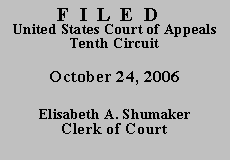

| HERBERT COLEMAN,
v.
ERIC FRANKLIN, Warden;
ATTORNEY GENERAL OF THE
STATE OF OKLAHOMA |
No. 06-6144
(D.C. No. 06-CV-21-L) |
OF APPEALABILITY
Coleman pled nolo contendere to robbery and kidnapping charges and was sentenced to twenty-five years' imprisonment on October 17, 2003. He did not directly appeal, but filed an application for post-conviction relief in state district court on July 6, 2005. That application was denied on October 3, 2005, and the Oklahoma Court of Criminal Appeals affirmed on December 8, 2005. On January 10, 2006, Coleman filed a § 2254 habeas petition in federal court advancing four grounds for relief: ineffective assistance of counsel, a Fourth Amendment claim based on an allegedly illegal nighttime search, a second Fourth Amendment claim, and cumulative error. The district court dismissed his petition as time-barred and did not grant a COA. Coleman now seeks a COA from this court.(1)
28 U.S.C. § 2244(d)(1)(A) provides a one year statute of limitations for § 2254 petitions from the date the judgment becomes final. Coleman's sentence became final on October 27, 2003,(2) giving him until October 27, 2004 to file a § 2254 petition. He did not file until January 10, 2006, well after the limitations period had run. Nor is Coleman eligible for statutory tolling while his state post-conviction claims were pending. Although "[t]he time during which a properly filed application for State post-conviction or other collateral review with respect to the pertinent judgment or claim is pending shall not be counted toward any period of limitation under this subsection," 28 U.S.C. § 2244(d)(2), Coleman did not file for state post-conviction relief until October 3, 2005, after the limitations period had run.
Coleman asks this court to equitably toll the statute of limitations because he was unaware of his rights. Equitable tolling "is only available when an inmate diligently pursues his claims and demonstrates that the failure to timely file was caused by extraordinary circumstances beyond his control." Marsh v. Soares, 223 F.3d 1217, 1220 (10th Cir. 2000). It is well settled that "ignorance of the law, even for an incarcerated pro se petitioner, generally does not excuse prompt filing." Id. (quoting Fisher v. Johnson, 174 F.3d 710, 714 (5th Cir. 1999)). Coleman has not presented the requisite extraordinary circumstances beyond his control, therefore we decline to apply equitable tolling.
For the reasons set forth above, Coleman's motion to proceed in forma pauperis is GRANTED, his request for a COA is DENIED, and his appeal is DISMISSED.
ENTERED FOR THE COURT
Carlos F. Lucero
Circuit Judge
1. Coleman's petition was filed after April 24, 1996, the effective date of the Antiterrorism and Effective Death Penalty Act ("AEDPA"); as a result, AEDPA's provisions apply to this case. See Rogers v. Gibson, 173 F.3d 1278, 1282 n.1 (10th Cir. 1999) (citing Lindh v. Murphy, 521 U.S. 320 (1997)). AEDPA conditions a petitioner's right to appeal a denial of habeas relief under § 2254 upon a grant of a COA. 28 U.S.C. § 2253(c)(1)(A). A COA may be issued "only if the applicant has made a substantial showing of the denial of a constitutional right." § 2253(c)(2). This requires Coleman to show "that reasonable jurists could debate whether (or, for that matter, agree that) the petition should have been resolved in a different manner or that the issues presented were adequate to deserve encouragement to proceed further." Slack v. McDaniel, 529 U.S. 473, 484 (2000) (quotations omitted). Because the district court did not rule on whether to grant COA, we assume it was denied. 10th Cir. R. 22.1(C). Accordingly, Coleman may not appeal the district court's decision absent a grant of COA by this court.
2. Coleman had ten days from his sentencing on October 17, 2003 to withdraw his nolo contendere plea. Okla. Stat. tit. 22, Ch. 18, App., Rule 4.2.